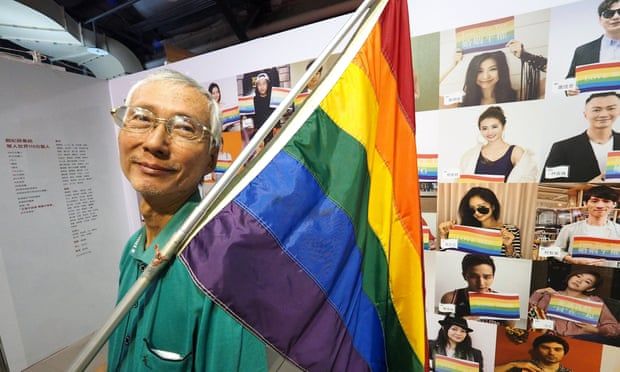Taiwan's same-sex marriage ruling could cement its place as Asia's liberal beacon
Landmark court case this week is likely to determine the success or failure of draft laws currently before parliament
Nicola Smith (The Guardian) in Taipei
Chi Chia-wei will find out on Wednesday if his decades long fight to make Taiwan the first country in Asia to legalise same-sex marriage has been a success.
Chi, 59, a pioneering Taiwanese gay rights activist, is the celebrated face behind one of the most controversial legal cases the island democracy has seen in recent years, where 14 judges must rule if the civil code, which states that marriage is between a man and a woman, is unconstitutional.
The constitutional court’s landmark ruling will not only determine the success or failure of draft new parliamentary laws to introduce marriage equality, but could cement Taiwan’s reputation as a beacon of liberalism in a region where the LGBT community faces increasing persecution.
Chi, an equal rights campaigner since he first came out as a gay teenager in 1975, remains pragmatic about making civil rights history. “If it doesn’t work out this time, I’ll keep on fighting for the people, and for human rights,” he said in an interview with The Guardian.
But he is determined that one day, the fight will be won.
“Somebody has to do it. I don’t want to see any more people commit suicide because they don’t have marriage equality,” he said.
Last October the suspected suicide of French professor, Jacques Picoux,who was unable to marry his Taiwanese partner of 35 years, Tseng Ching-chao, became a rallying call for Chi and other LGBT activists.
His struggle is also personal. Chi’s lawsuit, launched two years ago and supported by the municipal government in the capital, Taipei, is the latest of several attempts to get legal recognition for his 30 year relationship with his partner, who wishes to remain anonymous.
In 1986, when the nation was still under martial law, Chi was imprisoned for five months after submitting his first petition asking for gay marriage to be recognised.
As a flag bearer for equality, he hopes to inspire other LGBT activists fighting a crackdown across Asia.
On the eve of Taiwan’s court ruling, two gay men face a public caning in Indonesia. In South Korea, the military has been accused of carrying out a witch-hunt against gay recruits. In Bangladesh, 27 men were arrested last week on suspicion of being gay, a criminal offence.
Back in Taiwan, the political stakes of Wednesday’s decision are also high.
When President Tsai Ing-wen’s ruling Democratic Progressive Party (DPP) passed the first draft of a bill to legalise same-sex marriage in December, it prompted a fierce conservative backlash.
The issue has split Taiwanese society and vocal protests from a coalition of religious and right-wing family groups have caused many legislators to have second thoughts.
The fate of the legislation, soon to face a second reading, now lies in the hands of the court, believes Yu Mei-nu, the DPP parliamentarian who drafted it.
If the court ruled clearly in support of same-sex marriage and President Tsai offered her unequivocal support, it would embolden wavering legislators to vote in favour of the new laws, she argued.
“If the grand justices make a decision that is not very clear, and it depends on a legislative yuan [parliament] vote, then it will be difficult. I think most legislators will abstain,” she said.
“We want her (Tsai) to be braver. If she can come out and say ‘yes I support it’ then it will be passed.”
Ahead of her election last year, Tsai voiced her support for marriage equality in a Facebook video. “In the face of love, everyone is equal,” she said.
But as she marked the first anniversary of her inauguration this weekend with low public approval ratings, Tsai faced criticism from all sides over her handling of gay marriage.
“It’s a little bit depressing for us. Before the election, she was really pro-gay rights. But now she has kind of disappeared,” said student Vic Chiang, 23, at a Taipei rally last week on the International Day Against Homophobia.
Meanwhile, Robin Chen, a spokesman for the Coalition For Happiness of Our Next Generation, which links support for gay marriage with increased HIV infections, criticised the government for rushing the laws through.
“The majority of the population does not know what’s happening,” he said. “We need to discuss things on different levels because family is the foundation of society.”
His fears were shared by Father Otfried Chan, secretary-general of the Chinese Regional Bishops Conference, who believes the court will likely back gay marriage. “There is no debate,” he said. “It’s a one-sided game.”
Nerves are frayed ahead of the ruling, with both sides intending to demonstrate outside the court.
But for
Chi, the choice is simple.
“To legalise marriage would mean that Taiwan’s civil code and constitution will say that gay people are people,” he said. “If the law can be changed, Taiwan’s gay community will have human rights.”
發佈日期: 2017/05/22


轉
推
+1
寄